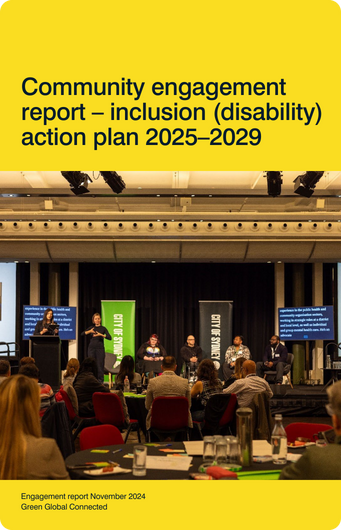Engagement report – inclusion (disability) action plan 2025–2029
We engaged with communities and partners to understand barriers to access and inclusion, as well as what could be improved in our next inclusion (disability) action plan 2025–2029.

We heard from more than 350 people, including people with disability, family members and carers, disability service providers and disability representative organisations.
Their feedback helped to create the vision of an inclusive City of Sydney:
Together we aim to drive social change and equity for people with disability. We will do this by promoting and protecting the inherent rights, dignity and voices of people with disability, and creating a more inclusive, accessible, resilient and diverse city for all.
Our engagement report details the key findings of this work.
Takeaways
- There is varied experience of people with disability, family and carers reporting positive community attitudes towards disability in the City of Sydney area, with 40% of people with disability not feeling welcome and included. More visibility of diverse disabilities, as well as raising greater awareness of intersectionality and of non-visible disabilities were suggested as next steps for the next plan.
- Liveable communities are places where people can live, learn, work and play, feel safe, belong, connect with others and grow old. Making a community liveable includes physical access and improving the way we connect, giving people the chance to participate and make social connections.
- People with disability surveyed were most satisfied with libraries (59%), parks and reserves (43%), community centres (40%), aquatic centres (45%) and customer service (41%). They were most dissatisfied with, accessible drop-off areas (73%), footpaths (63%), mobility parking (62%), public toilets (62%) and public seating (55%).
- 84% of survey respondents experience some form of discrimination, with those with intersectional identities experiencing greater discrimination. There are opportunities for the City of Sydney to support people with disability to prevent, report and respond to violence, abuse, neglect and exploitation, as well as amplify the visibility of diverse disabilities to help change community attitudes and behaviours.
- Less than half of survey respondents with disability are in paid employment. Feedback was given that the City of Sydney can provide more meaningful employment that is flexible and supportive to recruit, retain and develop employees with disability, while also continuing to promote a culture that celebrates diversity and inclusion.
- People with disability would like more opportunities to have a say on issues that are important to them. Opportunities to promote co-design and individual advocacy were seen as next steps to empower disability-led change.

